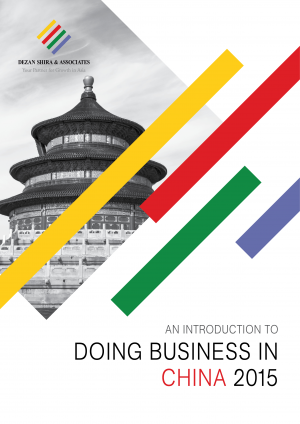Hedging Against RMB Volatility in China
As the RMB continues its steady march towards further internationalization, more and more foreign companies have begun using the Chinese currency. In early 2015, the RMB became the world’s fifth most traded currency and now even ranks second in the use of documentary credit.
This means that, for foreign-invested companies in China, RMB currency risk will be an issue of growing consideration. A company faces currency risk when it transacts in more than one currency. A change in the exchange rate can cause costs to rise significantly, or margins to evaporate.
For example, if a company selling to Chinese consumers in RMB has a loan in American dollars, it will be harder to repay that loan when the dollar rises in value. Likewise, an export company that sources materials for production in China will see its costs go up if the RMB appreciates.
Unlike the other top five currencies, the RMB is not freely convertible, but subject to foreign exchange controls. Despite that, recent years have seen increased volatility in the RMB, as evidenced with the sudden devaluation of the RMB by the Chinese central bank in August 2015.
![]() RELATED: Business Advisory Services from Dezan Shira & Associates
RELATED: Business Advisory Services from Dezan Shira & Associates
Hedging
Hedging instruments can protect companies against such foreign exchange risks. These are contracts that businesses sign with a financial institution to offset the adverse effects of currency swings.
With a forward contract, the company agrees to buy a set amount of currency for a set price. This way a company can lock in the price of the foreign currency on a future date. However, if by that time the foreign currency is cheaper than the price in the contract, the financial institution makes a profit.
Another common hedge is an option contract. In this case, the company has the choice, not the obligation to buy an amount of foreign currency at a fixed price in the future. This type of hedge will of course come at a higher price.
Hedging the RMB in China
Up until recently, China’s foreign currency controls made it difficult for financial institutions to offer hedging instruments to clients. A prime cause of this was the lack of liquidity in the offshore RMB market. Without a market for RMB outside of China, it would be difficult to create financial instruments that are based on the buying and selling of RMB.
However, since the implementation of financial reforms in the Shanghai Free Trade Zone in 2014, this has now become much easier. The reforms have led to increased ability to use offshore RMB in China. At the same time, as more and more offshore RMB clearing centers have been created, the offshore RMB market has grown substantially in size as well.
The combination of these two trends has led to a rapid development in RMB-denominated financial products, including hedge instruments. Banks in Hong Kong, Singapore and Taiwan have grown into the prime vendors of these financial instruments.
According to a report by the Economist Intelligence Unit, companies from these three localities are also the largest users of offshore RMB, followed by South Korea and the Eurozone. Perhaps surprisingly, it states that after the Shanghai Free Trade Zone, Hong Kong and Singapore, Luxemburg has developed into the fourth most used location for RMB liquidity management.
The new Free Trade Zones (FTZ) have the express purpose of promoting the greater use of offshore RMB. For the Guangdong and Fujian FTZs, this is combined with liberalized rules to promote financial integration with Hong Kong, Macau and Taiwan. The Hong Kong, Macau and Taipei clearing centers were the first to be designated, and have amassed substantial RMB pools. The FTZ branches of their financial institutions will be taking the lead in developing new RMB-denominated financial products, including hedging instruments.
|
Asia Briefing Ltd. is a subsidiary of Dezan Shira & Associates. Dezan Shira is a specialist foreign direct investment practice, providing corporate establishment, business advisory, tax advisory and compliance, accounting, payroll, due diligence and financial review services to multinationals investing in China, Hong Kong, India, Vietnam, Singapore and the rest of ASEAN. For further information, please email china@dezshira.com or visit www.dezshira.com. Stay up to date with the latest business and investment trends in Asia by subscribing to our complimentary update service featuring news, commentary and regulatory insight. |
![]()
 An Introduction to Doing Business in China 2015
An Introduction to Doing Business in China 2015
Doing Business in China 2015 is designed to introduce the fundamentals of investing in China. Compiled by the professionals at Dezan Shira & Associates, this comprehensive guide is ideal not only for businesses looking to enter the Chinese market, but also for companies that already have a presence here and want to keep up-to-date with the most recent and relevant policy changes.
 Adapting Your China WFOE to Service China’s Consumers
Adapting Your China WFOE to Service China’s Consumers
In this issue of China Briefing Magazine, we look at the challenges posed to manufacturers amidst China’s rising labor costs and stricter environmental regulations. Manufacturing WFOEs in China should adapt by expanding their business scope to include distribution and determine suitable supply chain solutions. In this regard, we will take a look at the opportunities in China’s domestic consumer market and forecast the sectors that are set to boom in the coming years.
 Trading With China
Trading With China
This issue of China Briefing Magazine focuses on the minutiae of trading with China – regardless of whether your business has a presence in the country or not. Of special interest to the global small and medium-sized enterprises, this issue explains in detail the myriad regulations concerning trading with the most populous nation on Earth – plus the inevitable tax, customs and administrative matters that go with this.
- Previous Article UK-China 7th Economic and Financial Dialogue: Opportunities in China for UK Investors
- Next Article Managing Your Business Through A China Downturn









